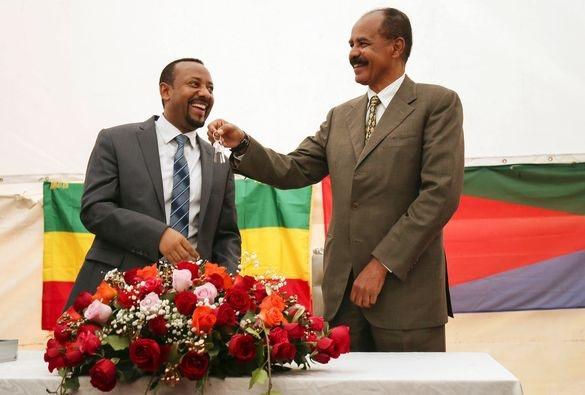
Debating Ideas is a new section that aims to reflect the values and editorial ethos of the African Arguments book series, publishing engaged, often radical, scholarship, original and activist writing from within the African continent and beyond. It will offer debates and engagements, contexts and controversies, and reviews and responses flowing from the African Arguments books.
“No land in Ethiopia must create and sustain a weed like them. We must ensure that people like them are not born. Just like the devil, they must be banished forever.” Daniel Kibret, advisor to the Prime Minister of Ethiopia and prominent Deacon of the Ethiopian Orthodox Church.
Since November 4, 2020, Ethiopia is embroiled in a horrific civil war bearing the hallmarks of genocide, war crimes, ethnic cleansing and man-made famine. Underneath this grisly reality lies an appalling politics of hate that was deployed in full-scale and is currently permeating the social, political and cultural facets of the country. In her insightful book, Fascism: A Warning, former US Secretary of State Madeleine Albright cautions us to be wary of leaders who sow fear and anger and not to be tempted to give away freedoms, or the freedom of others, to leaders promising law and order. She challenges us to ask the following questions and adds that the answers will either provide grounds for reassurance, or a warning of fascism that must not be ignored: Do the leaders exploit the symbols of patriotism, the flag and the pledge in a conscious effort to turn one against another? Do they solicit our cheers by speaking casually and with pumped up machismo about using violence to blow enemies away?
Jason Stanley’s book How Fascism Works: The Politics of Us and Them also offers an illuminating examination of the birth and rise of fascism in societies. Drawing on historical research of the early 20th century, he argues that fascist ideology exhibits the characteristics of a mythical past, ultra-nationalism of some variety (ethnic, religious, racial or cultural), an “Us” versus “Them” rhetoric, victimhood, propaganda and the promise of law and order.
In a scramble to make sense of what is happening in Ethiopia, these books provide a useful guide. While contemporary fascism has obvious variations from that of the early 20th century, its basic tenets remain consistent. Stanley argues that fascism starts by separating people between “us” and “them” appealing to various forms of ethnic, religious, linguistic or racial divides to ultimately shape its ideology and policy. The “us” casts itself as the righteous citizens and the “them”, by contrast, as the enemy – a criminal collective whose behaviour poses an existential threat to “us”. As the fear of “them” grows, “us” becomes to represent everything that is virtuous.
Secondly, fascism finds its genesis in a mythical and romantic past that it seeks to restore. It laments the tragic loss of a glorious history and harnesses feelings of nostalgia. According to this mythology, such a glorious past is free from any dark moments and has been lost due to the humiliation brought on by the current politics of the “others”. It extols national identity above all other identities. Ultra-nationalism of the “us” represented by the state and draped in national symbols is fervently deployed.
Third, violence is intrinsic to fascist politics. It is used both discursively and physically to pursue the project of cleansing politics and people of the perceived enemy. Significant resources are spent on incessant use of propaganda to influence perceptions of reality and ultimately shape the course of violent events on the ground. Using propaganda and conspiracy theories against segments of the population, the state seeks to limit the capacity for empathy among other citizens, paving the way for the execution and justification of mass atrocities, concentration camps and imprisonment, expulsion and in extreme cases, mass extermination.
And finally, fascist politics has a vocal proponent at the helm of the state and society. It is led by an authoritarian figure regarded by followers as singularly trustworthy leader. A master in exercising self-delusion. History tells us that fascist politicians convince citizens that they are in pursuit of a noble cause, conveying the message that they are representatives of the common good. None illustrates such delusion more than Adolf Eichmann, the architect of the Final Solution, who said: “I did no wrong. I was only trying to save a country that I loved.”
For a casual Ethiopia observer, it is an inescapable reality that fascist politics has rapidly thrived over the past year. The roots and rise of such political dispensation require a deeper historical and social inquiry. However, its frightening escalation is a phenomenon of the past three years following the appointment of Prime Minister Abiy Ahmed in 2018. A relatively unknown figure, Abiy was catapulted to state power on the heels of a popular youth movement and a political settlement achieved between the embattled members of the then ruling party, EPRDF. Ethiopians desperate for change celebrated his emergence pinning their hopes and aspirations on a more democratic future. Abiy launched his premiership preaching love and forgiveness and promising a new dawn for Ethiopia. He sought to mend grievances locally and internationally. He undertook bold and rapid measures to liberalize the economic and political space. He released political prisoners, invited exiled opposition parties and broke a two-decade old stalemate with neighbouring foe, Eritrea. As a result, his popularity rose and a full-blown “Abiymania” gripped the nation, with some referring to him as “Moses” and a divinely ordained Messiah. The international community followed suit, crowning him with the coveted Nobel Peace Prize in 2019. Abiy not only basked in such adulation, he claimed it was prophetic. In a speech to members of parliament, he claimed he always knew he would one day become the 7th king of Ethiopia.
What started out as a promising reform quickly faded. Communal violence, political assassinations, instability and mass displacements were recorded in all regions of the country. At present, Abiy presides over a country devastated by a brutal and intractable civil war which started in November 2020 and is threatening to tear the whole country apart. What preceded a bitter political dispute and an escalation of tension between Abiy’s Prosperity Party and his former colleagues of a regional party, the Tigray People’s Liberation Front (TPLF), evolved into an all-out war triggering a chain of catastrophic events. Abiy ordered a military campaign in the northern region of Tigray to quell a military and political rebellion. He dubbed his military move in Tigray as “rule of law” and “surgical operation” on the “criminal clique” of the TPLF.
Nothing proved further from the truth.
The “operation” unleashed a monstrous evil on the civilian population in Tigray fuelling fears of genocide. To win the war, Abiy deployed his federal forces and recruited the help of Tigray’s historical adversaries. Eritrea, led by the despot President Isayas Afeworki and neighbouring Amhara regional militias, and having a historical land dispute with Tigray, descended into Tigray with a carte blanche to conduct a revenge war. A scorched earth military campaign saw widespread war crimes committed. Civilians were deliberately targeted for massacres. Military jets bombed busy markets. Industries and essential infrastructure were decimated.
Ethiopian and Eritrean soldiers took pleasure in systematically gang-raping women and girls. They went on a door-to-door rampage searching and executing young and able-bodied men. They attacked villages, burning crops, shooting animals and looting properties. With no apparent military objective, they went after Tigray’s cultural and historical heritages, vandalizing churches, mosques and desecrating spiritual symbols. Soldiers enthusiastically film and flaunt images of their dying victims. Some even sneaked smiley selfies. Footages of bemused soldiers casually shooting at civilians on a mountain cliff were shared on social media. Reminiscent of the Rwandan genocide, dead bodies were dumped in rivers and washed down through international borders into Sudan.
Beyond the battlefront, the state’s assault on ordinary Tigrayans reached the military and civil service. Thousands in the military were detained for perceived collaboration and support to the TPLF. Tigrayan diplomats and military officers working overseas were either dismissed or recalled. Those working in international organizations were fired. Some were extradited from neighbouring countries.
In his rhetoric, Abiy led a campaign of vilifying his political opponents. He aptly played the blame-game, putting all the evils befalling Ethiopia on the TPLF, recasting the period prior to his appointment as one of darkness and manipulating people’s genuine grievance for his own political ends. Conveniently erasing his active role in the service and sustenance of the intelligence apparatus of the EPRDF/TPLF, he effectively plays into people’s amnesia to portray himself as distinct from his predecessors. He routinely uses incendiary language like “traitors”, “satans”, “daytime hyenas”, “cancer”, “weeds”, “tumour”, and “backstabbers” to refer to his Tigrayan adversaries. Such virulent attacks were not directed at known individuals, rather at an ambiguous collective of Tigrayans deliberately stoking fears among the populace. He doubled down on the rhetoric by encouraging citizens to expose enemies living among themselves (euphemism for Tigrayans). The state propaganda apparatus dutifully followed the pattern to excessively push narratives of victimhood and fear.
True to fascist politics, Abiy’s violent crusade is sold to Ethiopians as a law-and-order operation with the noble mission to “Save Ethiopia” or a campaign for the “Survival of Ethiopia”. Human and material sacrifices vanish in the name of Ethiopian patriotism and the promise of renewal. European fascism of the early 20th century tells no different story in war ravaged countries.
All the while, Ethiopian elites cheered on such depravity serving as the state’s reliable fascist base. Leading intellectuals, known personalities, artists, activists, religious and social leaders, “opposition” political parties all joined the chorus of war, pledging allegiance to the military and its (mis)adventures in Tigray. Few that spoke against the war were either harassed or forced into silence. Once pro-democracy activists transformed into leading war protagonists. The overwhelming evidence of mass atrocities committed against civilians is lost in the face of fascist politics. In an Orwellian state of affairs, an alternative reality is created in which Ethiopians only believed stories they were convinced to be true.
In the wider society, anti-Tigrayan sentiments deeply festered. Citizens willingly collaborated with the state to expose Tigrayans in their communities, easing the state’s ethnic profiling for random searches, mass incarceration and harassment. People with personal grudges randomly tipped police allowing random detention, seizure of Tigrayan properties and closure of prominent and small businesses. Individual greed and the legitimization of crackdown on Tigrayans gave bureaucratic vultures opportunity to profiteer. Tigrayans were compelled to pay hefty bribes to secure release from prison or exit out of the country.
This grim reality continues unabated. The history of Ethiopia is fraught with ethnic frictions, repression and a vicious cycle of war and violence. But today’s episode is distinctively different. Nations have risen against each other. Mistrust and discord are sown among communities and violence is glorified.
Heeding the warnings of Madeleine Albright, we must confront the Ethiopian reality for what it is. Fascist politics, brutishly propagated by the state and uncritically embraced by society, has taken hold of the country. While the role of leaders in fomenting hate for political expediency cannot be discounted, such discursive and physical violence does not exist in a vacuum. Perhaps the politics is a symptom of a deeper, structural and societal malaise that needs to be urgently interrogated. If there is any chance of reversing such tragic course, it must start with the recognition and rejection of the fascist politics of hate, “othering” and its violent consequences.





